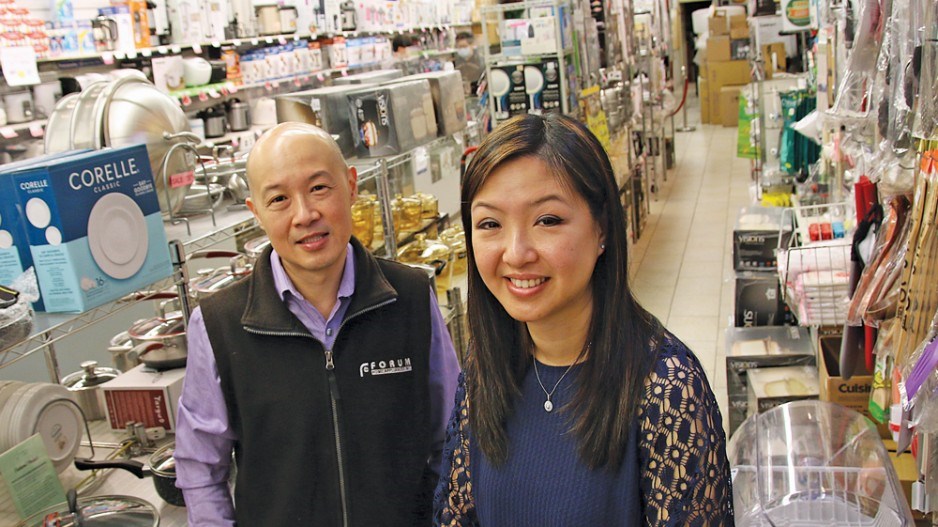When Tracy To was pepper-sprayed and robbed at her Forum Home Appliances store in Chinatown, it changed the way she felt about the neighbourhood where she has worked six days per week for the past 20 years.
Street crime, vandalism and squatters setting fires in back alleys has become commonplace, she said.
“It’s worse than it ever was before,” the family business’ vice-president of operations said. “The level of chaos that we see today is at least 10 times worse than what it was in 2010.”
Public safety is her top concern leading up to the October municipal elections.
She wants the city to fund more police on the streets and provide more financial support to keep people from falling through the cracks and into the downward spiral of homelessness, drug addiction and crime.
Habitual lawbreaking has become the norm for many, and the problem has reverberated across the Metro Vancouver region.
Burnaby Board of Trade (BBOT) president and CEO Paul Holden told BIV that business owners in his community are concerned about public safety and crime.
The BBOT has a seat on the City of Burnaby’s public safety committee, and Holden said that as the October municipal elections approach, it “will ensure that the issue of crime, and its impact on business, is discussed.”
Surrey Board of Trade president and CEO Anita Huberman is similarly concerned about crime in her community.
While the biggest public safety issue in Surrey is whether to transition to a municipal police force, many are also concerned about the problem of serial offenders.
In April, the BC Urban Mayors’ Caucus – a group of 13 mayors representing more than 55 per cent of B.C.’s population – urged the provincial government to usher in stronger bail conditions and stricter consequences for prolific offenders.
When B.C. Attorney General David Eby then said on May 5 that his government would launch an independent, short-term study into what to do about repeat criminal offenders in B.C., it disappointed some who thought there should be immediate action.
"I think I'm ... underwhelmed," tweeted Downtown Vancouver Business Improvement Association CEO Nolan Marshall.
“There has to be some level of reform, when the same people are committing the same crime – whether it’s street-level crime, or violence or gun-related crime,” Huberman told BIV.
Finding solutions requires input from all levels of government, including cities, she added.
For those in communities policed by B.C.’s 130 Royal Canadian Mounted Police (RCMP) detachments, an election issue may be whether the province should transition to a provincial police force. Richmond Mayor Malcolm Brodie and White Rock Mayor Darryl Walker have said they are happy with the RCMP's policing.
Public safety council meeting set for 3 p.m. today in Vancouver
Public safety is a big enough issue in Vancouver that city council on April 28 held a council meeting devoted to the topic. The meeting is set to resume today at 3 p.m., with nearly 60 people on the speakers’ list.
Greater Vancouver Board of Trade CEO Bridgitte Anderson told council on April 28 that she has heard of 40 “super-chronic offenders” who each have an average of 54 convictions.
“This is a complex issue involving mental health, homelessness, the opioid crisis, among other factors, and it’s clear that we need a multi-pronged solution,” she said.
Research Co. president Mario Canseco told BIV that his polling data shows a steady number of people who feel unsafe on Metro Vancouver streets.
“We’ve been asking that question for the past three or four years,” he said. “You’ll find people – it’ll be around 23 per cent – who say that they don’t feel safe walking in their neighbourhood, but the numbers haven’t changed dramatically.”
Recent Research Co. polling data shows that housing is Metro Vancouverites’ top municipal concern.
Public safety is the top concern for about 12 per cent of Surrey residents and four per cent of people in Vancouver. Across the region, only one per cent of Metro Vancouverites said public safety was their top concern.
Canseco said he believes many people consider public safety a secondary, yet important, issue but he has not done any direct polling to support that.
His data did show that the number of survey respondents who believe crime is rising outnumber those who say it is declining by an 11-to-one margin.
Vancouver Police Department (VPD) data shows violent crime in the city was up 7.1 per cent in 2021.
“We’re seeing an increase in spitting incidents, which I think is showing a lack of common decency and civility,” VPD Chief Adam Palmer told council.
About 72 per cent of the 297 spitting incidents in Vancouver last year were “complete strangers spitting on other people with no provocation whatsoever prior to the incident,” he said.
These kinds of crimes worry tourism advocates who believe Vancouver’s reputation is getting tarnished.
Destination Vancouver president and CEO Royce Chwin told council that he and his team have noticed convention organizers are apprehensive.
“In our recent sales mission to bring business to Vancouver, I and my team are increasingly getting these questions – ‘Is it safe there? Will our delegates be safe when they attend a conference in your city? I see the media stories. What is going on?’” Chwin said.
“Our product, if you will, is [being] perceived as a safe and welcoming city. That global reputation, and even our domestic reputation, is under increasing threat.” •



